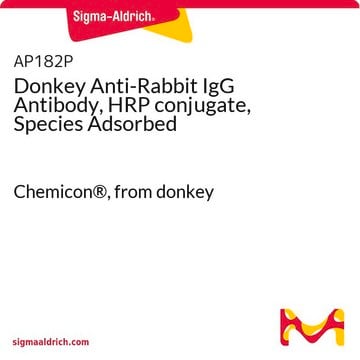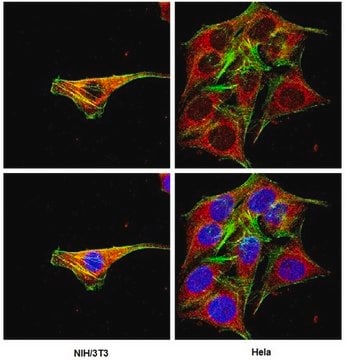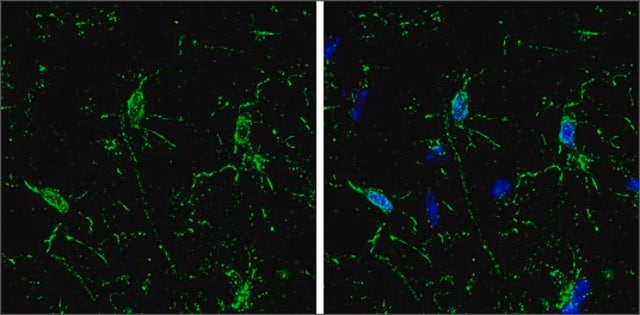ZRB1294
Anti-CD14 Antibody, clone 1B4 ZooMAb® Rabbit Monoclonal

recombinant, expressed in HEK 293 cells
About This Item
Empfohlene Produkte
Biologische Quelle
rabbit
Qualitätsniveau
Rekombinant
expressed in HEK 293 cells
Konjugat
unconjugated
Antikörperform
purified antibody
Antikörper-Produkttyp
primary antibodies
Klon
1B4, recombinant monoclonal
Beschreibung
recombinant, expressed in HEK 293 cells
Produktlinie
ZooMAb® learn more
Form
lyophilized
Mol-Gew.
calculated mol wt 40.08 kDa
observed mol wt ~49 kDa
Speziesreaktivität
human
Speziesreaktivität (Voraussage durch Homologie)
monkey
Verpackung
antibody small pack of 25 μL
Grünere Alternativprodukt-Eigenschaften
Waste Prevention
Designing Safer Chemicals
Design for Energy Efficiency
Learn more about the Principles of Green Chemistry.
Erweiterte Validierung
recombinant expression
Learn more about Antibody Enhanced Validation
sustainability
Greener Alternative Product
Methode(n)
affinity binding assay: suitable
flow cytometry: suitable
immunocytochemistry: suitable
immunohistochemistry (formalin-fixed, paraffin-embedded sections): suitable
western blot: suitable
Isotyp
IgG
Epitopsequenz
C-terminus
Protein-ID-Hinterlegungsnummer
UniProt-Hinterlegungsnummer
Grünere Alternativprodukt-Kategorie
Versandbedingung
ambient
Lagertemp.
2-8°C
Posttranslationale Modifikation Target
unmodified
Allgemeine Beschreibung
Each ZooMAb® antibody is manufactured using our proprietary recombinant expression system, purified to homogeneity, and precisely dispensed to produce robust and highly reproducible lot-to-lot consistency. Only top-performing clones are released for use by researchers. Each antibody is validated for high specificity and affinity across multiple applications, including its most commonly used application. ZooMAb® antibodies are reliably available and ready to ship when you need them.
Learn more about ZooMAb here.
Spezifität
Immunogen
Anwendung
Evaluated by Western Blotting in THP-1 cell lysate.
Western Blotting Analysis: A 1:1,000 dilution of this antibody detected CD14 in THP-1 cell lysate.
Tested applications
Western Blotting Analysis: A 1:1,000 dilution from a representative lot detected CD14 in human liver tissue lysate.
Flow Cytometry Analysis: 0.1 μg from a representative lot detected CD14 in one million THP-1 cells.
Immunohistochemistry (Paraffin) Analysis: A 1:100 dilution from a representative lot detected CD14 in human tonsil tissue sections.
Immunocytochemistry Analysis: A 1:100 dilution from a representative lot detected CD14 in THP-1 cells.
Affinity Binding Assay: A representative lot of this antibody bound CD14 peptide with a KD of 1.0 x 10-12 in an affinity binding assay.
Note: Actual optimal working dilutions must be determined by end user as specimens, and experimental conditions may vary with the end user
Zielbeschreibung
Physikalische Form
Rekonstituierung
Lagerung und Haltbarkeit
Rechtliche Hinweise
Haftungsausschluss
Sie haben nicht das passende Produkt gefunden?
Probieren Sie unser Produkt-Auswahlhilfe. aus.
Lagerklassenschlüssel
11 - Combustible Solids
WGK
WGK 1
Analysenzertifikate (COA)
Suchen Sie nach Analysenzertifikate (COA), indem Sie die Lot-/Chargennummer des Produkts eingeben. Lot- und Chargennummern sind auf dem Produktetikett hinter den Wörtern ‘Lot’ oder ‘Batch’ (Lot oder Charge) zu finden.
Besitzen Sie dieses Produkt bereits?
In der Dokumentenbibliothek finden Sie die Dokumentation zu den Produkten, die Sie kürzlich erworben haben.
Unser Team von Wissenschaftlern verfügt über Erfahrung in allen Forschungsbereichen einschließlich Life Science, Materialwissenschaften, chemischer Synthese, Chromatographie, Analytik und vielen mehr..
Setzen Sie sich mit dem technischen Dienst in Verbindung.








